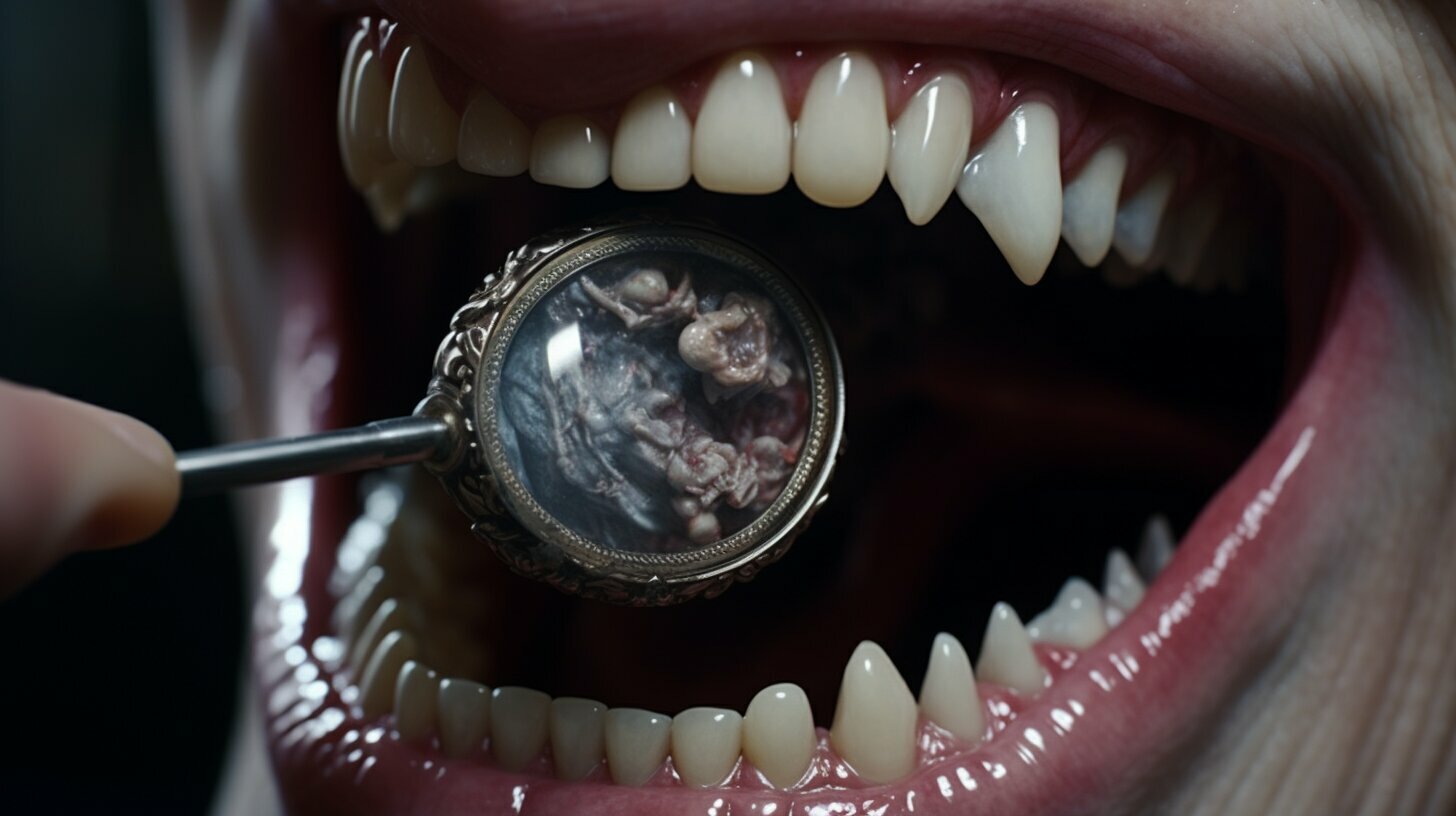Unraveling the Mystery: Why is it Called Wisdom Teeth?
Have you ever wondered why those pesky third molars are called wisdom teeth? Well, let me shed some light on this dental enigma. The term “wisdom teeth” is not just a random name; it actually has a fascinating origin and holds a significant meaning.
Wisdom teeth, also known as third molars, derive their name from the age at which they typically emerge: the late teens to early twenties. This is a time when individuals are believed to have gained some wisdom through their life experiences. So, you see, these molars are associated with the notion of growing wiser.
But what exactly is the purpose of these teeth? Wisdom teeth are designed to aid in grinding down coarse foods, such as roots and tough meats. However, changes in our diets over time and the reduced size of our jaws have rendered these extra molars less necessary than they once were.
Unfortunately, wisdom teeth can often cause trouble when they don’t have enough space to emerge properly. This condition, known as impacted wisdom teeth, can lead to various issues such as pain, infection, and misalignment. That’s why dentists often recommend their removal to prevent further complications.
Interestingly, not everyone develops wisdom teeth, and some lucky individuals can keep them without any problems. However, for those who do experience discomfort, extraction is generally considered a safe solution. Recovery time may vary, depending on factors such as the complexity of the extraction and an individual’s healing process.
Intriguingly, the origins of the term “wisdom teeth” can be traced back to the belief that they emerge at a time when people are considered wiser. While this may have some symbolic significance, the pain associated with wisdom teeth is far from metaphorical. Lack of space, misalignment, inflammation, and pressure on nerves can all contribute to the discomfort experienced.
Thankfully, relief can be found through various means, such as pain relief medications, saltwater rinses, good oral hygiene practices, and icing the affected area. It is always advisable to consult with a dental professional to determine the best course of action for your particular situation.
So, there you have it. Wisdom teeth are not just a dental curiosity but an intriguing part of our oral anatomy that reflects our evolutionary history. While they may have served a purpose in the past, in modern times, they often cause more trouble than they’re worth. If you’re curious about your own wisdom teeth, it’s never a bad idea to seek professional advice and maintain good oral hygiene to ensure your dental well-being.
Key Takeaways:
- The term “wisdom teeth” originates from the idea that they emerge at an age when individuals are believed to have gained some wisdom through their life experiences.
- Wisdom teeth are designed to aid in grinding down coarse foods, but changes in diets and jaw size have made them less necessary over time.
- Impacted wisdom teeth, which lack sufficient space to emerge properly, can cause pain, infection, and misalignment, necessitating their removal.
- Not everyone develops wisdom teeth, and extraction is generally a safe solution for those who experience discomfort.
- Pain relief medications, saltwater rinses, good oral hygiene, and professional consultation can help alleviate the discomfort associated with wisdom teeth.
The Evolutionary Connection: Origins of the Term
To understand why they are called wisdom teeth, we need to travel back in time and explore their origin and evolution. These mysterious molars, also known as third molars, have puzzled scientists and dentists alike for centuries. The name “wisdom teeth” stems from the idea that they emerge during the late teens to early twenties, a time when individuals are expected to have gained some wisdom through life experiences. But how did this name come to be?
The etymology of the term “wisdom teeth” can be traced back to ancient times. In Greek mythology, the god Apollo was associated with wisdom, so it was believed that these teeth emerged when individuals reached an age of maturity and wisdom. The concept of wisdom teeth was also mentioned in ancient Roman and Egyptian texts, further cementing their association with this phase of life.
As the saying goes, “With age comes wisdom,” and these teeth were believed to be a physical manifestation of that wisdom.
Throughout history, different cultures had various names for these late-developing molars. In medieval England, they were called “stubble teeth” because they were thought to emerge when a person had reached adulthood and could grow facial hair. In some Native American tribes, they were called “grandmother” or “elder” teeth, symbolizing the transition from childhood to adulthood.
While the exact origins of the term “wisdom teeth” may be shrouded in mystery, what remains clear is that they have been associated with wisdom and maturity across different cultures throughout history. Today, as we continue to evolve and our diets change, these teeth have become less necessary. Yet, they still hold a special place in our oral anatomy, serving as a reminder of our evolutionary past.
| Term | Meaning |
|---|---|
| Wisdom Teeth | Third molars that typically emerge during the late teens to early twenties, symbolizing the wisdom gained through life experiences. |
| Stubble Teeth | Medieval term for wisdom teeth, associating their emergence with adulthood and the ability to grow facial hair. |
| Grandmother/Elder Teeth | Term used in some Native American tribes to symbolize the transition from childhood to adulthood. |
The Wisdom Teeth Experience: Function and Issues
Wisdom teeth serve a functional purpose in our mouths, but they can also bring along a host of issues. These third molars, named after the wisdom we are expected to gain in our late teens and early twenties, are believed to have evolved to aid in grinding down coarse foods. However, with changes in our diets and jaw size over time, wisdom teeth have become less necessary.
Impacted wisdom teeth, which don’t have enough space to emerge properly, can cause a range of problems. These can include pain, infection, and misalignment. The discomfort associated with wisdom teeth is often due to factors such as lack of space, misalignment, inflammation, and pressure on nerves. It’s no wonder that many individuals opt for their extraction.
Extraction of wisdom teeth is generally safe, although recovery can vary. Some individuals may not develop wisdom teeth at all, while others can keep them if they don’t cause any issues. However, if you’re experiencing pain or other complications, it’s essential to consult with a dental professional.
Relief from wisdom teeth problems can be found through various means. Pain relief medications, saltwater rinses, ice packs, and practicing good oral hygiene are some methods that can offer temporary relief. However, it’s important to remember that these measures may only provide temporary relief. Consulting with a dental professional is crucial to fully address and resolve any wisdom teeth issues you may be facing.
| Issues with Wisdom Teeth | Relief Options |
|---|---|
| Pain | Pain relief medications, ice packs |
| Infection | Antibiotics prescribed by a dental professional |
| Misalignment | Consultation with an orthodontist or oral surgeon |
| Lack of space | Extraction recommended by a dental professional |
Good Oral Hygiene: A Key to Wisdom Teeth Health
Maintaining good oral hygiene is crucial when dealing with wisdom teeth. Regular brushing and flossing help remove food particles and plaque, reducing the risk of infection and decay. Saltwater rinses can also provide temporary relief by reducing inflammation and promoting healing. Remember to visit your dentist regularly for check-ups and professional cleanings, as they can monitor your wisdom teeth and provide guidance on necessary actions.
Wisdom Teeth Woes: Pain, Extraction, and Relief
Dealing with impacted wisdom teeth can be a painful and frustrating experience, but there are ways to find relief. The discomfort associated with these third molars can range from mild to severe, and it often stems from factors such as lack of space, misalignment, inflammation, and pressure on nerves.
Relief can be found through a variety of methods. Pain relief medications, such as ibuprofen or acetaminophen, can help manage the pain and reduce inflammation. Saltwater rinses can provide soothing relief and help keep the area clean. Applying ice packs to the affected area can help numb the pain and reduce swelling. Good oral hygiene, including regular brushing and flossing, can prevent infection and reduce discomfort.
“Dealing with impacted wisdom teeth can be a painful and frustrating experience, but there are ways to find relief.”
It’s important to note that seeking professional advice is crucial when dealing with impacted wisdom teeth. A dentist or oral surgeon can evaluate the situation and determine the best course of action. In some cases, extraction may be recommended to alleviate the pain and prevent further complications. The extraction procedure is generally safe and can often be done under local anesthesia or sedation.
Recovery from wisdom tooth extraction can vary from person to person. Some individuals may experience minimal discomfort and resume their normal activities within a few days, while others may require a longer recovery period. Following post-operative instructions, such as taking prescribed medications, applying ice packs, and avoiding certain foods, can help ensure a smooth recovery process.
Summary:
- Impacted wisdom teeth can cause pain and discomfort due to lack of space, misalignment, inflammation, and pressure on nerves.
- Relief can be found through pain relief medications, saltwater rinses, ice packs, and good oral hygiene.
- Professional consultation is essential to determine the need for extraction, which is often recommended for impacted wisdom teeth.
- Recovery from wisdom tooth extraction varies, and following post-operative instructions is important for a smooth recovery.
| Key Points | Details |
|---|---|
| Causes of Discomfort | Lack of space, misalignment, inflammation, and pressure on nerves |
| Relief Methods | Pain relief medications, saltwater rinses, ice packs, good oral hygiene |
| Importance of Professional Consultation | Dentist or oral surgeon can determine the need for extraction |
| Recovery Process | Varies from person to person, post-operative instructions should be followed |
The Trouble with Wisdom Teeth: Modern Perspectives
Though wisdom teeth have served us well throughout history, they often pose more trouble than they are worth in modern times. As our diets have evolved and our jaws have become smaller, these third molars have become less necessary for grinding down coarse foods. In fact, many people no longer develop wisdom teeth at all, while others experience issues when they do erupt.
To navigate the potential problems associated with wisdom teeth, professional consultation is crucial. An experienced dentist or oral surgeon can assess the positioning and alignment of the teeth, identify any potential issues, and recommend the appropriate course of action. This could range from keeping a close eye on the teeth to monitoring for any signs of discomfort or infection, or it may involve the extraction of the wisdom teeth to prevent future complications.
While extractions may seem daunting, particularly for those who fear dental procedures, the process is generally safe and well-tolerated. However, it’s important to follow the post-extraction care instructions provided by the dental professional to ensure a smooth recovery. Good oral hygiene practices, such as regular brushing and flossing, can also help mitigate the risk of complications and improve overall oral health.
For those experiencing pain or discomfort related to wisdom teeth, relief options are available. Over-the-counter pain relief medications can provide temporary relief, while saltwater rinses and ice packs can help reduce inflammation and alleviate symptoms. However, it’s essential to consult with a professional for an accurate diagnosis and personalized treatment plan to address any underlying issues.
Table: Wisdom Teeth Troubles and Potential Relief Options
| Issue | Potential Relief Options |
|---|---|
| Pain and Discomfort | Over-the-counter pain relief medications, saltwater rinses, ice packs |
| Infection | Antibiotics prescribed by a dental professional, good oral hygiene |
| Misalignment | Professional consultation, potential extraction or orthodontic treatment |
| Crowding or Damage to Adjacent Teeth | Consultation with a dental professional, potential extraction |
While wisdom teeth may have an intriguing evolutionary history, the modern perspective suggests that their presence often leads to more trouble than they’re worth. Seeking professional advice, maintaining good oral hygiene practices, and being proactive in addressing any issues can help ensure optimal oral health and prevent potential complications down the road.
Wrapping Up the Wisdom Teeth Enigma
Understanding the origins and issues associated with wisdom teeth helps us appreciate the complexities of our oral anatomy. Named after the notion that they emerge when we’re supposedly wiser, these third molars serve the purpose of grinding down coarse foods. However, our diets and jaw sizes have evolved, rendering wisdom teeth less necessary than they once were.
But when wisdom teeth become impacted, oh boy, do they cause a ruckus! Lack of space leads to pain, infection, and even misalignment. That’s when extraction becomes the name of the game. Don’t worry though, it’s generally safe. Just be prepared for a variable recovery experience, as everyone’s healing process is as individual as their Netflix queue.
So, what can you do to ease the agony? Pain relief medications, saltwater rinses, and good old-fashioned ice packs can offer some much-needed temporary respite. And here’s a tip: consult with a dental professional for personalized advice and a dash of expert wisdom (the non-tooth kind).
Wisdom teeth are like a nostalgic throwback to our evolutionary past, a reminder that our ancestors needed those extra molars to chew their way to survival. But in the here and now, they often cause more trouble than they’re worth. So, let’s raise a glass (or a cup of ice-cold water to soothe that swollen jaw) in celebration of modern dentistry and bid adieu to these pesky oral relics.
FAQ
Why are they called wisdom teeth?
Wisdom teeth are named as such because they typically emerge during the late teens to early twenties when individuals are expected to have gained some wisdom through life experiences.
What is the purpose of wisdom teeth?
Wisdom teeth aid in grinding down coarse foods, although their necessity has decreased due to changes in our diets and jaw size over time.
What issues can impacted wisdom teeth cause?
Impacted wisdom teeth, which don’t have enough space to emerge properly, can cause pain, infection, and misalignment.
Do I need to get my wisdom teeth extracted?
Extraction is recommended when problems arise, although not everyone develops wisdom teeth, and some individuals can keep them if no issues occur.
Is wisdom teeth extraction safe?
Extraction is generally safe, although recovery can vary from person to person.
How can I relieve the pain associated with wisdom teeth?
Relief can be found through pain relief medications, saltwater rinses, good oral hygiene, and ice packs. It’s also advisable to consult with a dental professional.
What is the evolutionary connection to wisdom teeth?
Wisdom teeth are a fascinating part of human oral anatomy that reflects our evolutionary history, but in modern times, they are often more trouble than they’re worth.
- Discovering Why Do Women Wear Lipstick: A Deeper Look - 19/12/2023
- Why Do Golfers Only Wear One Glove? - 16/12/2023
- Why Don’t Hobbits Wear Shoes? - 14/12/2023
Hi, I’m Rhiannon, the lead author behind The News Wire. As a passionate journalist, I strive to bring you the latest news and updates from all over the world. With a keen eye for detail and a dedication to unbiased reporting, I aim to deliver well-researched and informative articles that keep you informed and engaged. From breaking news to in-depth analyses, I cover a wide range of topics with the aim of keeping you in the loop. Join me on The News Wire as we explore the dynamic and ever-changing landscapes of global events, uncovering the stories that matter most.






